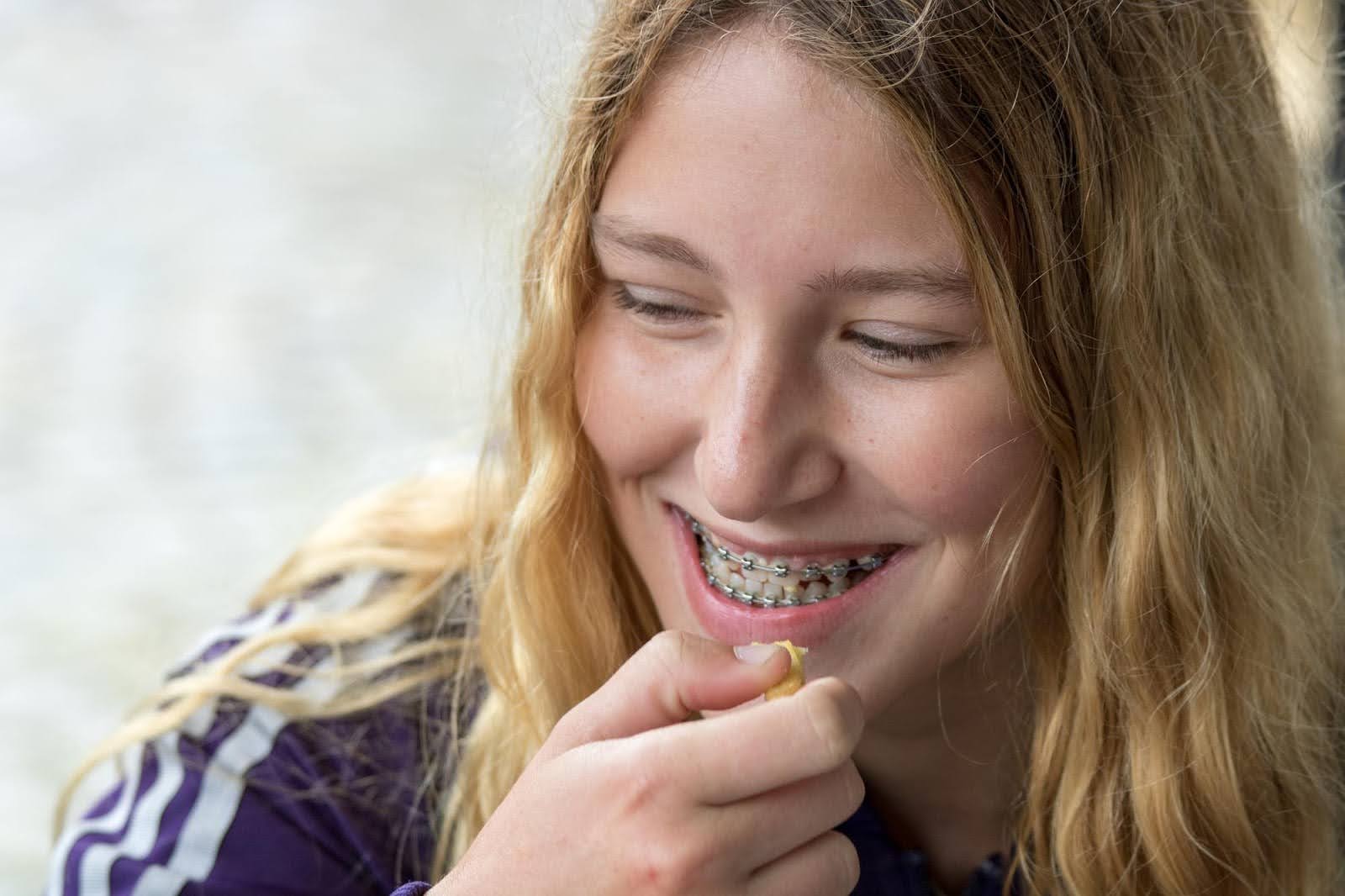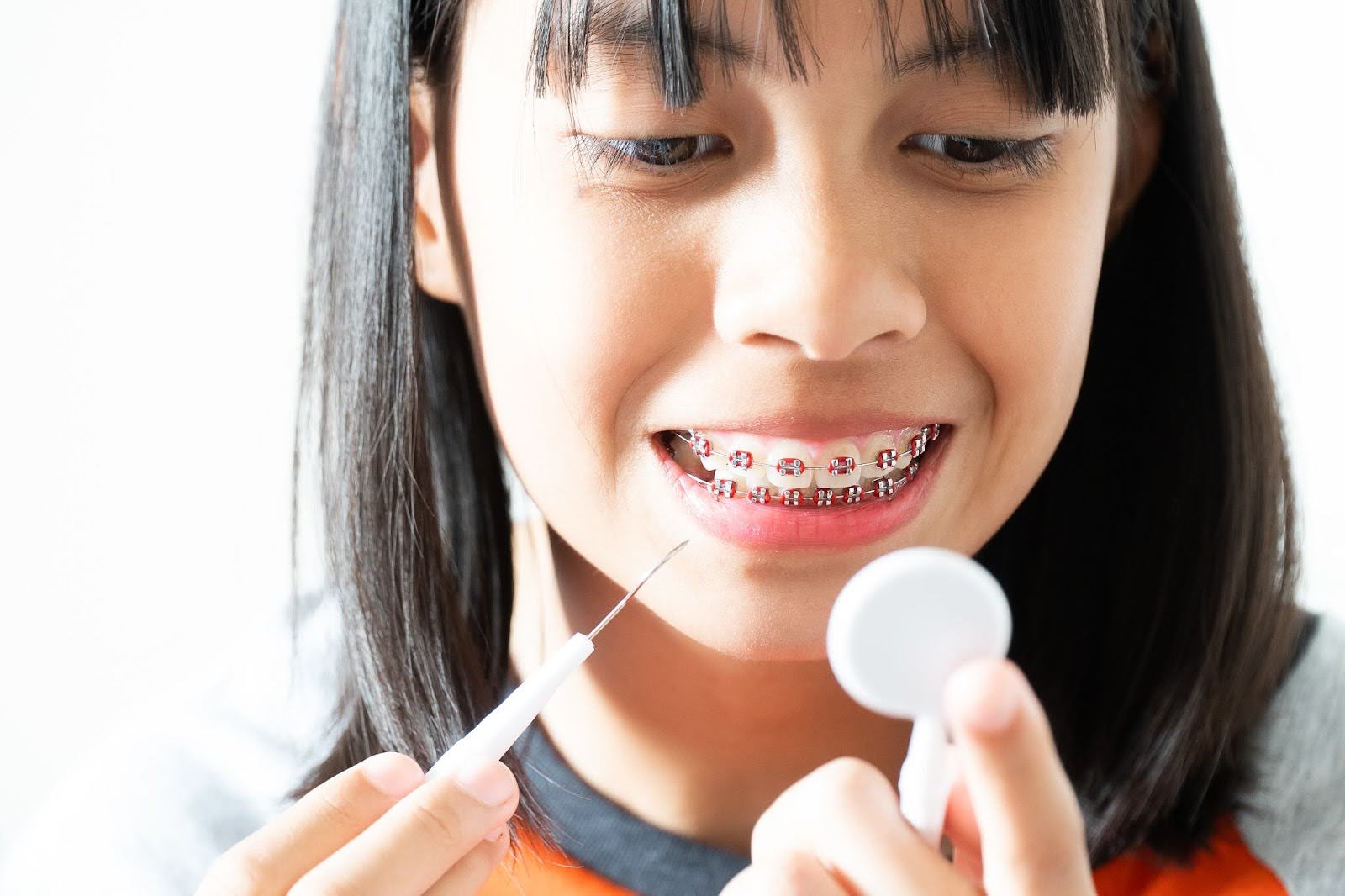Whether you’re a teenager or an adult, the decision to get braces often comes with a mix of excitement and apprehension. One of the most common questions our new patients ask is, “How long does it take to get used to braces?”
Understanding the adjustment period is crucial, as it can help set realistic expectations and ease any concerns you might have. In this blog, we’ll explore what you need to know about adapting to life with braces, ensuring you’re well-prepared for the road ahead!
The Initial Experience: After Getting Your Braces On
The moment you walk out of the orthodontist’s office with your new braces, you might feel a whirlwind of sensations and emotions.
How You’ll Physically Feel
Physically, the first thing you’ll likely notice is a sense of tightness or pressure on your teeth. This is completely normal: it’s a sign that the braces are starting to do their job. Your new brackets and wires are gently (but firmly) applying pressure to move your teeth into their desired positions. The tightness may also be accompanied by mild discomfort or soreness, especially when you bite down or chew.
How You’ll Emotionally Feel
Emotionally, the experience of getting braces varies from patient to patient. Many people feel a strong mix of excitement and nervousness. On the one hand, you’ll have anticipation of the positive changes that braces will bring. After all, you’re on your way to achieving a beautiful, straighter smile!
On the other hand, it’s normal to feel a bit nervous or anxious. The idea of having a foreign object in your mouth for an extended period can be daunting. You might worry about how you’ll look, how you’ll speak, or how you’ll eat. Rest assured, these feelings are temporary and will subside as you become more accustomed to your braces.
In the days following your appointment, it’s important to be patient with yourself. Your mouth is adjusting to a new reality, and it will take a little time to get used to the sensation of having braces.
Does Getting Braces Hurt?
Besides asking how long it takes to get used to braces, one of the more common concerns is whether the process will be painful. The good news is that the actual fitting of braces is generally painless!
The orthodontist will carefully attach brackets to your teeth and thread a wire through them, which might feel a bit strange but shouldn’t cause any pain. However, you might experience some discomfort from having your mouth open for an extended period. This can lead to a bit of jaw fatigue, but it’s usually manageable and subsides shortly after the procedure is complete.
Post-Procedure Discomfort
Once the braces are on, you may start to feel some soreness and sensitivity in your teeth or gums. This is most noticeable in the first few days as your mouth begins to adjust to the new hardware.
The pressure from braces might make your teeth feel tender, especially when chewing or biting down. Your gums could additionally feel a little irritated as they get used to the brackets and wires.
Tips on Managing Pain or Soreness
While some moderate discomfort is inevitable, there are several effective ways to get rid of braces pain:
- Over-the-Counter Pain Relievers: Medications like ibuprofen or acetaminophen can help alleviate soreness and reduce inflammation. It’s a good idea to take a dose before the pain becomes too intense, following the dosage instructions on the label.
- Orthodontic Wax: Orthodontic wax can be applied to the brackets and wires that are irritating the inside of your cheeks or lips. It creates a smooth barrier that prevents further rubbing, helping to soothe sore spots.
- Saltwater Rinses: A simple saltwater rinse can work wonders for sore gums. Mix a teaspoon of salt into a glass of warm water and swish it around your mouth for about 30 seconds before spitting it out. This can help reduce inflammation while promoting healing.
Remember, the initial discomfort is temporary and usually subsides within a week or so. Your mouth will gradually adapt to the braces, and you’ll find that the soreness becomes less noticeable over time.
What to Eat After Getting Braces

After getting your braces fitted, your mouth will likely feel tender and sensitive, making it important to choose foods that are gentle on your teeth. In the first few days, it’s best to stick to soft foods that require minimal chewing. Here are some recommended options for specific foods to eat after getting braces:
- Yogurt: Because it’s so smooth, yogurt is easy to eat and can be a soothing choice for sore mouths. Plus, it’s packed with calcium and probiotics, which are great for your overall health.
- Mashed Potatoes: Mashed potatoes are a filling option that won’t put too much pressure on your teeth.
- Smoothies: Blending fruits, vegetables, and yogurt into a smoothie can provide a nutritious meal that’s easy to consume. You can even add protein powder or nut butter for an extra boost!
- Scrambled Eggs: Light and fluffy, scrambled eggs are a great source of protein and are gentle on your teeth.
- Soup: Warm, broth-based soups can be very soothing and are easy to eat. Just make sure to avoid any hard or crunchy ingredients
Foods To Avoid After Getting Braces
While adjusting to your new braces, it’s important to avoid certain foods that can damage the brackets and wires. Here are some foods to steer clear of:
- Popcorn: The kernels can get stuck in your braces and are difficult to remove, potentially leading to discomfort and even damage.
- Nuts: Hard and crunchy, nuts could easily break brackets or bend wires.
- Chewing Gum: Due to its stickiness, gum can get tangled in your braces and is very difficult to clean out.
- Hard or Chewy Candies: Hard candies may break brackets and wires if you bite down on them. Caramels, taffy, and other chewy candies will stick to your braces, increasing your risk of cavities.
- Crunchy Vegetables and Fruits: Raw carrots, apples, or other crunchy produce should be cut into small, manageable pieces or cooked until soft to avoid putting too much pressure on your braces.
If you’re feeling a little uneasy about adjusting your meals, don’t worry! As your mouth gets used to the braces, you’ll find it easier to incorporate a wider variety of foods back into your diet.
Timeline: How Long It Takes to Get Used to Braces
Adjusting to life with braces is a gradual process, but with each passing day, you’ll find it becomes easier and more manageable.
The First Week
The first week with braces is often the most challenging. During this period, you’ll likely experience a gradual decrease in discomfort. The initial soreness and sensitivity will start to subside, and you’ll begin to find new ways to chew food properly.
It might feel awkward at first, but with each meal, you’ll get better at navigating your new braces. Additionally, you may notice changes in your speech patterns as your tongue adjusts to the brackets and wires. Rest assured this is completely normal and usually improves within a few days.
The First Month
By the end of the first month, you should notice a significant reduction in soreness. Your mouth will have adapted to the braces, and you’ll find it much easier to eat a wider variety of foods. The initial dietary restrictions will become less stringent as you learn which foods you can comfortably manage.
You’ll also become more adept at maintaining oral hygiene with braces, making your daily care routine feel less cumbersome.
After 2 Months
Most patients find that within two months, they barely notice their braces at all. The initial discomfort and awkwardness will be a distant memory, and wearing braces will feel like a normal part of your daily life. You’ll be able to speak, eat, and go about your activities with minimal interference from your braces.
Keep in mind that these initial challenges are just a small part of the broader experience; the final result will be well worth the effort! Stay patient and positive, knowing that each day brings you closer to the smile you’ve always wanted.
Helpful Tips For Adjusting to Braces

Maintaining excellent oral hygiene is very important when you have braces. Here are some specific tips to help you keep your mouth clean:
Brushing Techniques
Start by using a soft-bristled toothbrush and fluoride toothpaste. Brush at a 45-degree angle to the gums and make sure to clean all surfaces of your teeth, including the areas around the brackets and wires. Consider using an electric toothbrush, which can be more effective at removing plaque. Brush for at least two minutes, and don’t forget to brush your tongue to remove bacteria.
Flossing Tools
Flossing with braces can be challenging, but it’s essential to remove food particles and plaque from between your teeth. Use floss threaders or orthodontic floss to navigate around the wires. Alternatively, you can use interdental brushes or water flossers, which are easier to maneuver and just as effective at cleaning around your braces.
Mouthwash
Rinsing with an antimicrobial or fluoride mouthwash helps to reduce plaque buildup and prevent cavities. It’s also very beneficial for reaching areas that traditional brushing might miss.
Regular Orthodontist Appointments
Regular visits to your orthodontist are key to ensuring that your treatment progresses smoothly and effectively.
Your orthodontist will need to periodically adjust your braces to ensure that your teeth are moving as planned. These adjustments might involve tightening the wires, changing the bands, or making other modifications to keep your treatment on track. Regular adjustments are crucial for achieving the desired results within the estimated timeframe.
During your appointments, your orthodontist will also monitor the progress of your treatment and address any issues that may arise. This includes checking for any signs of tooth decay, gum disease, or damage to the braces. Early detection of problems can prevent other issues down the line.
Better Braces Treatment with Callan Orthodontics!
At Callan Orthodontics, we take a personalized approach to orthodontic treatment. From your first consultation to the day your braces are removed, our dedicated team is here to support and guide you every step of the way. Contact us today to schedule our next appointment!

